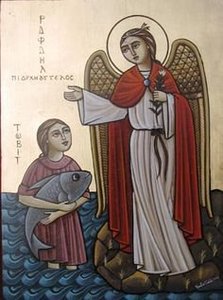The Beloved Lazarus

I have the keys of Hades and of death
Jesus Christ prepared the hearts and minds of the disciples, the crowd, and Mary and Martha to accept the truth of resurrection; He strengthened their faith in Him as the giver of life, and the source of resurrection. Everyone saw Him standing in front of the tomb, in which Lazarus was buried for four days, they saw Him raising His hands to the heaven, holding the keys to Hades and of death (Rev 1:18) and they heard Him talking to the Father. They all felt that the act Jesus about to do with great authority is for the glorification of the Father, so that the Son would be glorified through Him... Jesus then called with a great voice saying, "Lazarus, come forth" (John 11:43) So the dead came out with his hands and feet wrapped and his face covered. Truly, the abyss heard the voice of the Lord and trembled, "The voice of the LORD is powerful; The voice of the LORD is full of majesty. The voice of the LORD shakes the wilderness; The LORD shakes the Wilderness of Kadesh." (Ps 29:4-8) the abyss heard and its forces released its captive.
Jesus awoke Lazarus from his deep sleep with His great voice (John 11:11) disregarding death, as He is Life. It is a picture of what Paul described "For the Lord Himself will descend from heaven with a shout, with the voice of an archangel, and with the trumpet of God. And the dead in Christ will rise first." (1 Ths 4:16)
Continue reading…He bruises, but He binds up (Job5:18)
The chastening of the loving Father
God loves His creation “…for God is love” (1 John 4:8), and He deals with His children with all the love, for “…He loved them to the end” (John 1:13). As a loving Father who has compassion and tender mercy toward His children, but He does not spoil them or overlook His part as a loving Father. In this St. Paul says, “For whom the Lord loves He chastens, And scourges every son whom He receives. If you endure chastening, God deals with you as with sons; for what son is there whom a father does not chasten? But if you are without chastening, of which all have become partakers, then you are illegitimate and not sons” (Hebrews 12:6-8). Yes, and the Bible also says, “Behold, happy is the man whom God corrects; Therefore do not despise the chastening of the Almighty. For He bruises, but He binds up; He wounds, but His hands make whole” (Job 517,18). It is not the revenge of a mighty God who avenges His servants, but a chastening of a Father to His beloved children to their benefit and their cure. A chastening that is void of cruelty, but is mingled with mercy, that is why it is said about Him: “For He bruises, but He binds up; He wounds, but His hands make whole” (Job5:18).
Continue reading…Fear Challenges Faith
“Why are you fearful, O you of little faith?” (Matthew 8:26)
These were the word of our Lord Jesus to the disciples when they were facing death… “And suddenly a great tempest arose on the sea, so that the boat was covered with the waves. But He was asleep” (v. 24). What is strange is that Jesus was with them on the ship in the midst of this terrible situation, so how can they fear if He was with them?! Could the ship be destroyed while He was on it?! ... impossible. Even if He sleeps, would someone think that He does not know what befalls them? Or does He not care about what they are facing? Unfortunately, this was what they thought, and they even woke Him up, saying, “Lord, save us! We are perishing!” (v. 25), “Teacher, do you not care that we are perishing?” (Mark 4:38), so He rebuked them, saying, “Why are you fearful, O you of little faith?” (Matthew 8:26), “Why you are so fearful? How is it that you have no faith?” (Mark 4:40).
It is impossible for the ship be sunk or those on it be destroyed while the Lord is in the midst of it ... but our faith is weakened when the mind thinks, and fear overcomes and controls the person... Hence, Christ rebuking us said, “Where is your faith?" (Luke 8:25).
Continue reading…Invitation for Repentance
God, the Lover of mankind, out of His love for His children is inviting them to repentance because “He desires all men to be saved” (1Tim2:4). It is not His will that any should perish, but that all should come to repentance (2 Pet3:9). He says, ‘“Do I have any pleasure at all that the wicked should die? Says the Lord God, ‘and not that he should turn from his ways and live?’” (Eze18:23). He may use different methods in order to lead them to repentance… Either by advice through His commandments e.g. “Repent, for the kingdom of heaven is at hand!” (Matt2:3; 4:17), or by warning from the consequences of sin as in “Unless you repent you will all likewise perish” (Lk13:5, 7), or by threatening “Remember therefore from where you have fallen; repent and do the first works, or else I will come to you quickly and remove your lampstand from its place- unless you repent” (Rev2:5), or by fear “… others save with fear, pulling them out of the fire” (Jud1:23). He also could make use of someone to lead others to repentance as He used the sailors to call Jonah to pray, or to send someone to rebuke others for repentance as He sent Nathan to King David in order to lead him to repentance. He also could use nature to push someone to repent as it happened with Jonah who expressed his repentance from the belly of the whale, or to use disasters and tribulations as He used the famine to lead the prodigal son to return to himself and then to return to his father. He could also make use of diseases and pestilences, as in the saying of the Lord Jesus to the paralytic, “Sin no more, lest a worse thing come upon you” (Jn5:14). He could also permit certain troublesome or a problem seams to be without any solution in order to come to Him with repentance before seeking His solution; even facing the moment of death, exactly as what happened with King Hezekiah who prayed with repentance, when he was near death, and he wept bitterly, so the Lord added to his age 15 years (Isa38:1-5). Thus, repentance is useful, whatever its method, whether by leniency or harshness.
Continue reading…Tobit Represents Christ

- Tobit is a Hebrew name, meaning “Good God” or “Blessed or praise-worthy God.”
The Lord Christ is our “good God” who incarnate for our salvation. He is the “good Shepherd” (Jn 10:9, 11), and the “good Teacher” (Matt 19:16). He is worthy to be praised and blessed from both the seen and unseen creatures. - The son, Tobit, carries the same name of his father (Tobit 1:9). He also was very similar to his father, according to Raguel’s words to his wife, “How much like my cousin is this young man!” (Tobit 7:2).
The Lord Christ says, “He who has seen Me has seen the Father… I and My Father are one” (Jn 14:9; 10:30). The Son is begotten from the Father (Matt 3:17, Jn 3:16-18; 6:69), and He is one with Him in essence of divinity, as the Lord Jesus says, “Believe Me that I am in the Father and the Father in Me” (Jn 14:11). - Tobit was born as an alien at the land of exile away from his home land, Jerusalem.
Christ was born in our land away from his heavenly place and He came to us from heaven “No one has ascended to heaven but He who came down from heaven, that is, the Son of Man who is in heaven” (Jn 3:13).